Monday Musicale with the Maestro – January 18, 2021 – “Sharing the Spirit of Martin’s Dream”
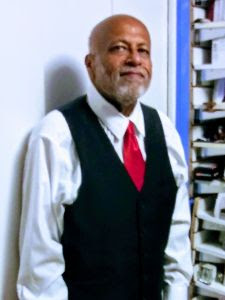
“Sharing the Spirit of Martin’s Dream”
Eulogy for a Dream
Words by Martin Luther King
Music by William Henry Curry
I was born in 1954, the year of Brown vs. Board of Education. Every African American born that year had a parent who said at one point, “This one will have a brighter future.”
My mother was such a parent, and she introduced me to the joys of reading and culture. Being informed about current events was very important in my home. So in August 1963, the Curry family gathered around the television set as Dr. Martin Luther King gave his “I Have a Dream” speech during one of the largest political rallies in American history.
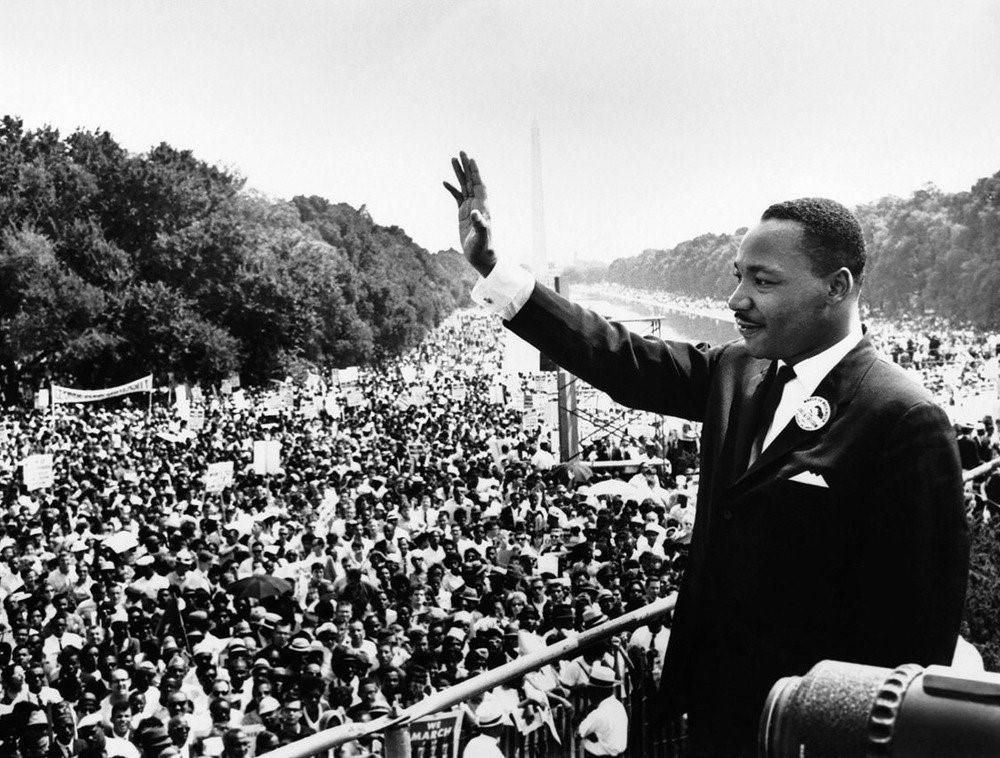
The crowd at this protest march was estimated at 250,000 people. According to Wikipedia, 75-80% of the attendees were African American. The purpose of the “March on Washington for Jobs and Freedom” was to lobby for civil rights and economic equality for African Americans.
According to the New York Daily News,
More than 6,000 police, parade marshals, and military MPs were deployed throughout the capital to prevent any violence. Some 4,000 troops were kept on alert at two nearby bases. But as the great march and memorial rally came to an end, there had been only three arrests for minor violations–none by African Americans.
It was a day of joy and optimism.
But it was with a different feeling entirely that we watched the funeral of Dr. King in April 1968.
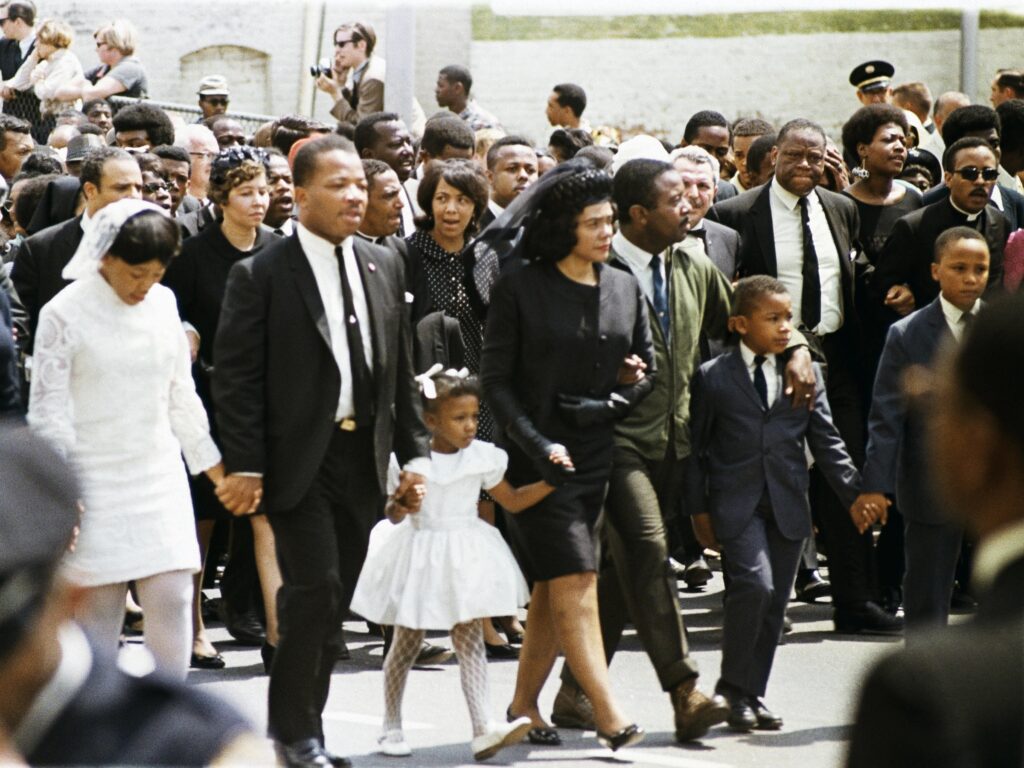
Coretta Scott King attends the funeral of her husband flanked by three of their four children. (One did not attend.) To her immediate right is Ralph Abernathy, whose daughter Juandalynn I knew as a fellow student at Oberlin. The boy on the far right of the photo is Martin Luther King III.
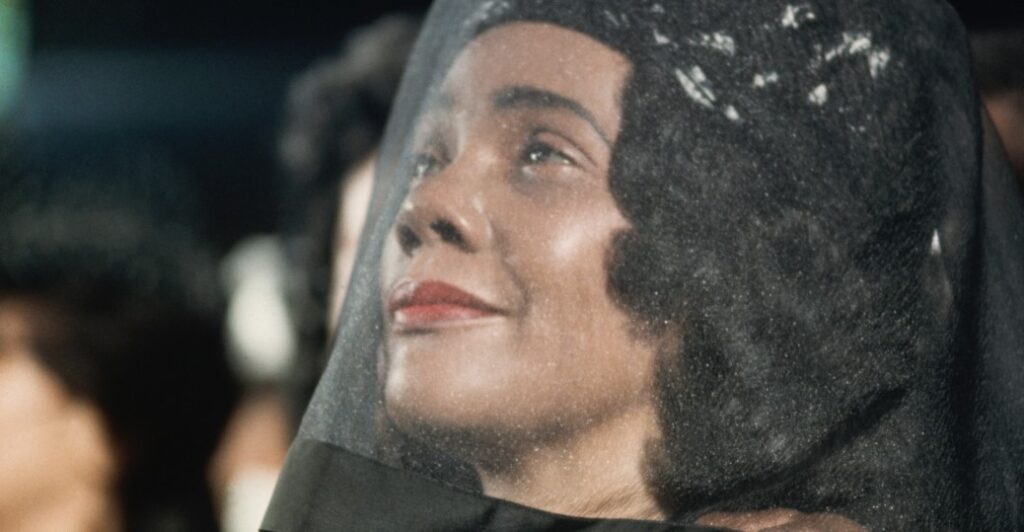
Some thirty years later, those two haunting memories led to my composing Eulogy for a Dream.
The idea of writing this piece came from King’s widow, Coretta Scott King (1927-2006), who came to be known as “The First Lady of the Civil Rights Movement.” Not only was she a prominent member of that struggle, but she was also a fervent advocate for women’s equality and LGBTQ rights. What may be less well known is that, in her teens, she had wanted to be a classical singer, and her singing talent earned her a scholarship to attend the New England Conservatory in Boston. (Where Florence Price studied!) It was at a party in Boston where she met her future husband.
My association with Mrs. King began in 1985, when I was Associate Conductor of the Indianapolis Symphony and was programming a great deal of contemporary music. In my research, I found a wonderful new work by Pulitzer Prize-winning composer Joseph Schwantner titled New Morning for the World: “Daybreak of Freedom”—a piece for orchestra and speaker featuring the words of Martin Luther King. Intrigued, I called the composer to ask if King’s widow, Coretta Scott King, had ever been asked to narrate the piece. He laughed and said no, because he thought (with so many important things to do) that she would reject that out of hand. So I began thinking of other people to perform the work with me. Michael, my partner, said, “Why don’t you just call up the King Center in Atlanta and ask her yourself!” When I repeated what Schwantner had said, Michael was silent and left the room.
But when he returned ten minutes later, he’d been busy. Without my realizing it, he had looked up the number of the King Center. He came into the room, handed me the phone, and said, “Mrs. King is on the line, and she would like to speak to you.” (!)
She and I had a great conversation, and a few days later, she agreed to be the speaker in Schwantner’s piece. I will never forget the composer’s excitement when I told him the good news. Things moved quickly, and a month later, on Sunday morning, September 22, 1985, I met her at the airport in a limousine to take us to the rehearsal at the concert hall.
She was magnificent, both at the rehearsal and the evening performance later that night. Afterwards, in accepting compliments, she was very modest, simply saying, “Well, I DO know Martin’s words!”
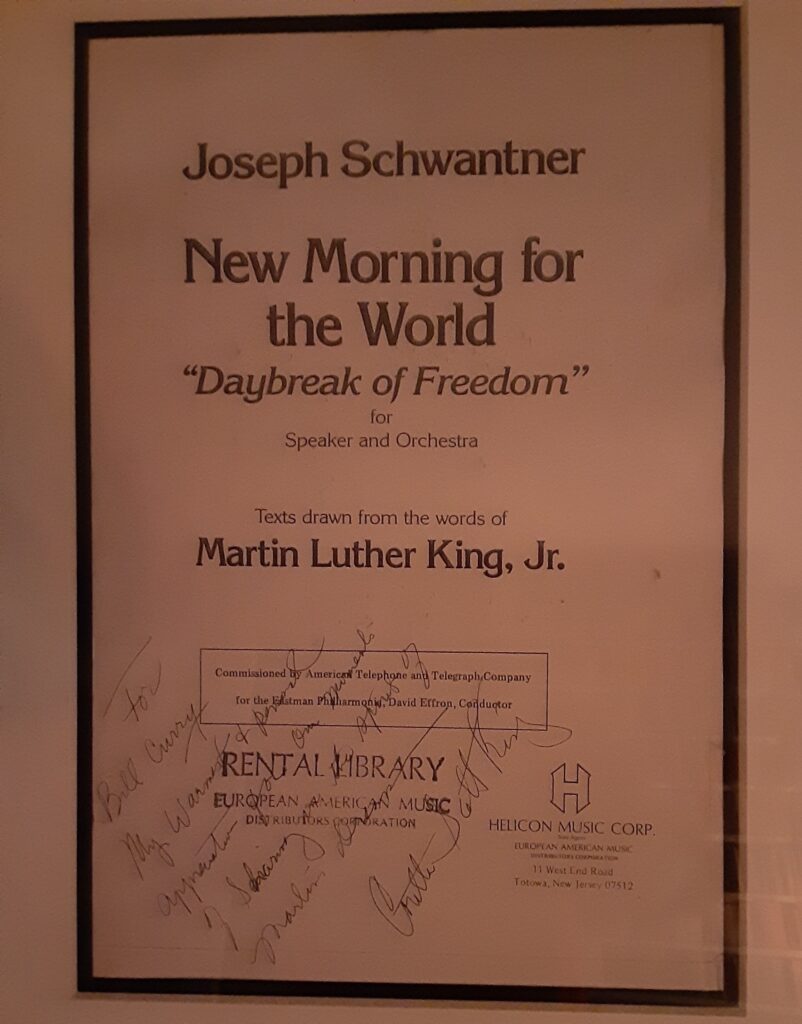
My autographed score, where Mrs. King has written, “For Bill Curry, My warmest and personal appreciation for our moments of sharing the spirit of Martin’s Dream.
–Coretta Scott King”
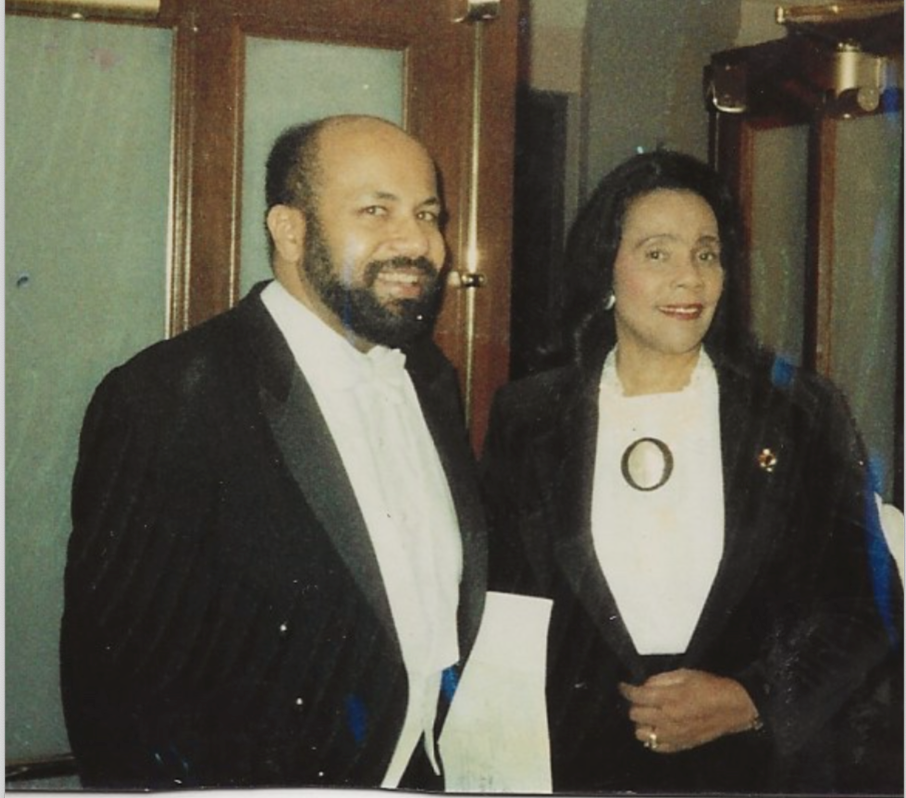
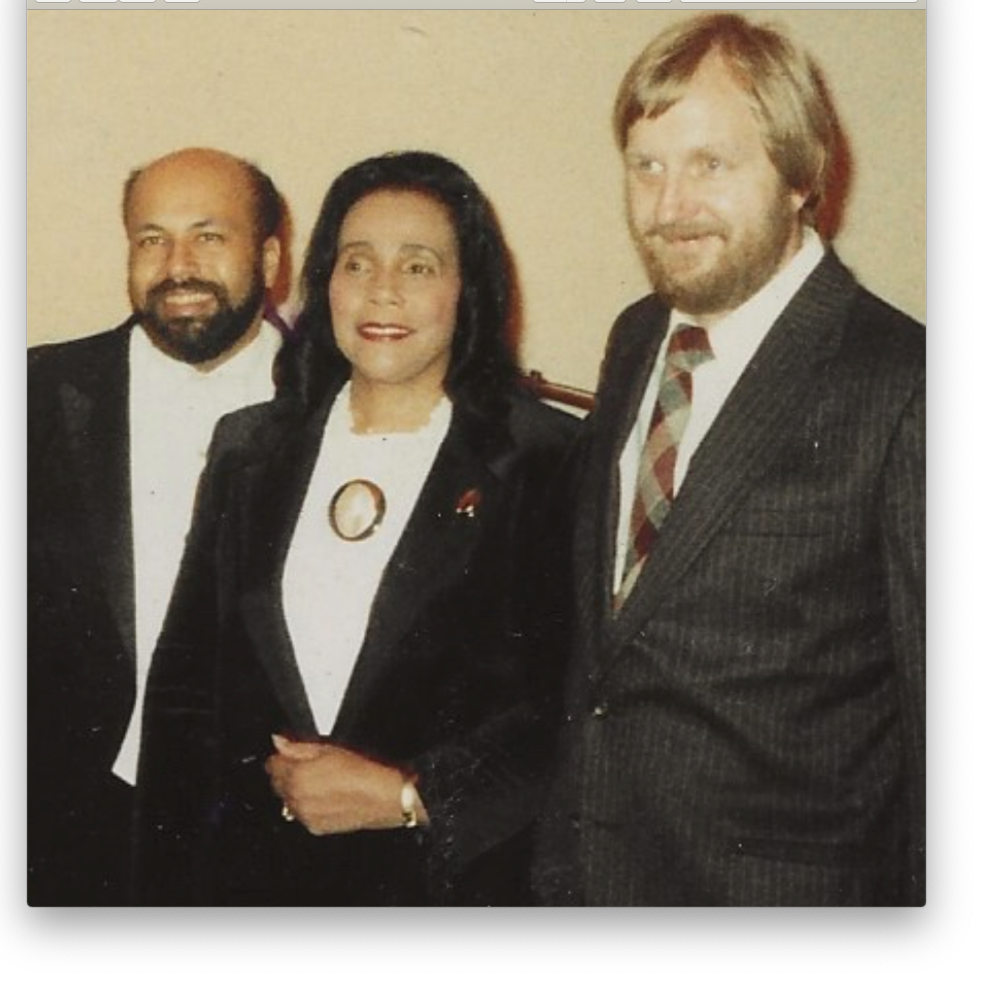
William Henry Curry and Coretta Scott King with composer Joseph Schwantner (right).
During the reception, I mentioned that it was my dream to start composing again—though I had thought that dream abandoned long ago, during college. (I was now 31.) Life is a series of challenges, she told me, and she encouraged me to begin composing once more. She even suggested that I might want to consider writing a piece of my own using her husband’s words (though that seemed an impossible dream to me at that time.)
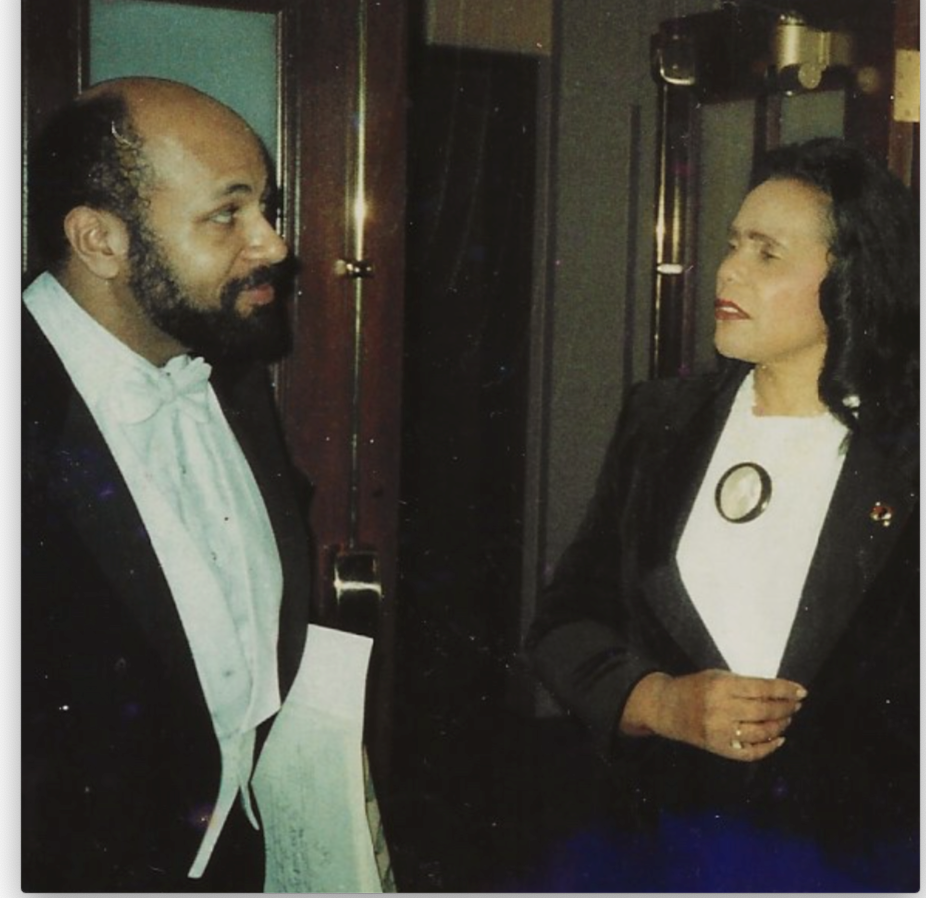
Three years later, however, I did return to composing. And in June 1999, I conducted the Indianapolis Symphony Orchestra in the premiere of my Eulogy for a Dream, the MLK piece inspired by her comment.
In this work, we are to imagine we are attending Dr. King’s funeral. Memories of civil rights marches are evoked with hymn-like music and the frequent quotation of the anthem “We Shall Overcome.” The orchestra depicts the deep sadness of the occasion as well as the radiant memories of a life dedicated to a glorious cause. A speaker reads from the writings of Dr. King. At the time I wrote this work, I was going through a mid-life crisis. I chose these words and sentiments because they had a special meaning for me; they helped to heal me. I am grateful that listeners have also found the words to be healing and universally beloved.
The audience response to this work has been more than gratifying. At the world premiere in 1999, the audience was on its feet with a standing ovation even before the work was over. Michael, who had given my piece its title, was there to share with me the rapturous response to my first major work. I would describe this as being the happiest day in my life.
It has since been heard all over America on NPR’s radio show In Performance Today. Over a dozen American orchestras have performed it, including the Indianapolis Symphony, the North Carolina Symphony, the Nashville Symphony, and the Toledo Symphony. In 2009, the work received its Asian premiere in Taiwan. EFAD has been narrated by such luminaries as William Warfield, Avery Brooks, and Jubilant Sykes.
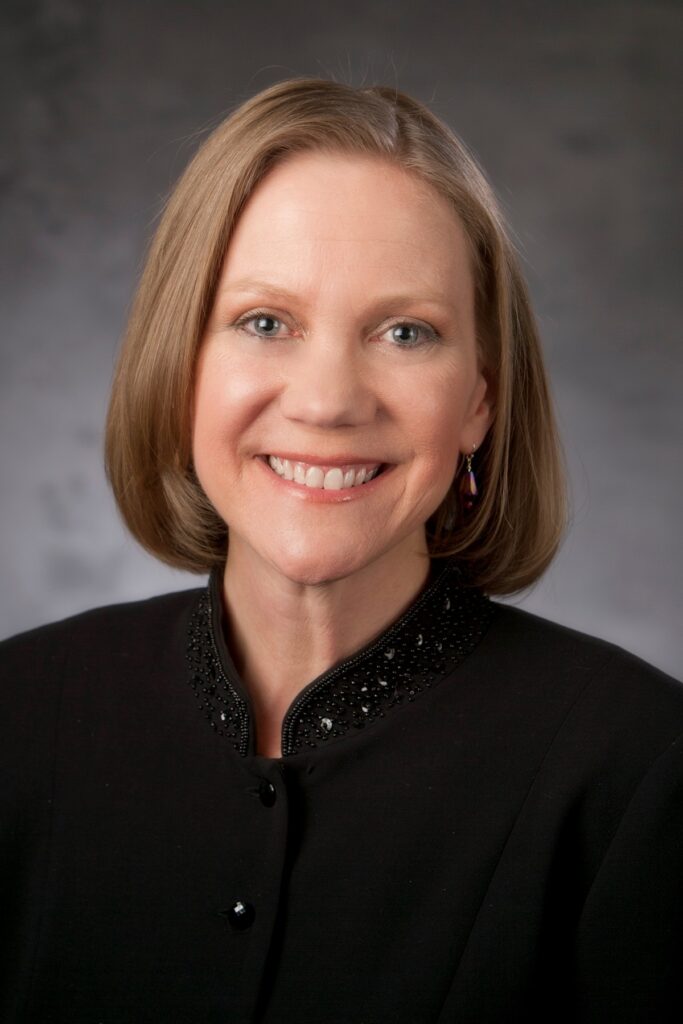
But in January 2017, during the DSO’s MLK celebration with Duke University, I had the privilege of delivering Dr. King’s words myself. The performance was conducted by the DSO’s Assistant Conductor and Principal 2nd Violinist, Shelley Livingston. She and the orchestra both did a wonderful job.
Our DSO feature today is a recording of that performance, which was broadcast by our classical station WCPE the next year on the 50th Anniversary of Dr. King’s death.
As the composer of Eulogy for a Dream, I had one of the most inspirational persons and eloquent wordsmiths in human history with whom to work. The music was written from the heart. May it go to the heart.
Eulogy for a Dream
William Henry Curry, Composer and Speaker
Shelley Livingston, Conductor
Durham Symphony Orchestra
Sounds of Justice & Inclusion – Honoring Rev. Dr. Martin Luther King, Jr.
Reynolds Industries Theater, Duke University
Durham, NC January 14, 2017
William Henry Curry
Music Director
Durham Symphony Orchestra
Comprehensive Editor (Text): Suzanne Bolt
Copy Editors: Marianne Ward and Tina Biello
Digital Layout and Publication: Tina Biello and Marianne Ward
Audio and Video by Mark Manring
Celebrating Maestro Curry’s 50 years conducting
& 11 years with the Durham Symphony!
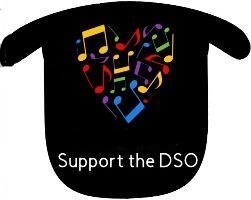
“Monday Musicale with the Maestro” would not be possible without your support!
Thank you for being a important part of the Durham Symphony Orchestra family! We appreciate your sacrifice to help impact our community and wish you all the best in this New Year!
Funding is provided (in part) by the Durham Arts Council’s Annual Arts Fund, the N.C. Arts Council (a division of the Department of Natural and Cultural Resources), and a grant from the Triangle Community Foundation.



